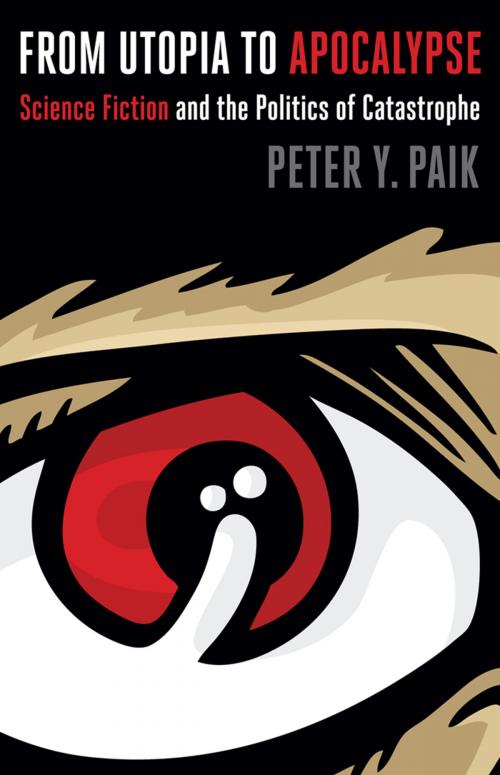From Utopia to Apocalypse
Science Fiction and the Politics of Catastrophe
Fiction & Literature, Literary Theory & Criticism, Science Fiction, Theory| Author: | Peter Y. Paik | ISBN: | 9781452915128 |
| Publisher: | University of Minnesota Press | Publication: | March 18, 2010 |
| Imprint: | Univ Of Minnesota Press | Language: | English |
| Author: | Peter Y. Paik |
| ISBN: | 9781452915128 |
| Publisher: | University of Minnesota Press |
| Publication: | March 18, 2010 |
| Imprint: | Univ Of Minnesota Press |
| Language: | English |
"I read Peter Y. Paik’s lucid, graceful, ruthless book in one single astonished sitting. I scarred it all over with arrows and exclamation points, so I can read it again as soon as possible." —Bruce Sterling
Revolutionary narratives in recent science fiction graphic novels and films compel audiences to reflect on the politics and societal ills of the day. Through character and story, science fiction brings theory to life, giving shape to the motivations behind the action as well as to the consequences they produce.
In From Utopia to Apocalypse, Peter Y. Paik shows how science fiction generates intriguing and profound insights into politics. He reveals that the fantasy of putting annihilating omnipotence to beneficial effect underlies the revolutionary projects that have defined the collective upheavals of the modern age. Paik traces how this political theology is expressed, and indeed literalized, in popular superhero fiction, examining works including Alan Moore and Dave Gibbons’s graphic novel Watchmen, the science fiction cinema of Jang Joon-Hwan, the manga of Hayao Miyazaki, Alan Moore’s V for Vendetta, and the Matrix trilogy. Superhero fantasies are usually seen as compensations for individual feelings of weakness, victimization, and vulnerability. But Paik presents these fantasies as social constructions concerned with questions of political will and the disintegration of democracy rather than with the psychology of the personal.
What is urgently at stake, Paik argues, is a critique of the limitations and deadlocks of the political imagination. The utopias dreamed of by totalitarianism, which must be imposed through torture, oppression, and mass imprisonment, nevertheless persist in liberal political systems. With this reality looming throughout, Paik demonstrates the uneasy juxtaposition of saintliness and cynically manipulative realpolitik, of torture and the assertion of human dignity, of cruelty and benevolence.
"I read Peter Y. Paik’s lucid, graceful, ruthless book in one single astonished sitting. I scarred it all over with arrows and exclamation points, so I can read it again as soon as possible." —Bruce Sterling
Revolutionary narratives in recent science fiction graphic novels and films compel audiences to reflect on the politics and societal ills of the day. Through character and story, science fiction brings theory to life, giving shape to the motivations behind the action as well as to the consequences they produce.
In From Utopia to Apocalypse, Peter Y. Paik shows how science fiction generates intriguing and profound insights into politics. He reveals that the fantasy of putting annihilating omnipotence to beneficial effect underlies the revolutionary projects that have defined the collective upheavals of the modern age. Paik traces how this political theology is expressed, and indeed literalized, in popular superhero fiction, examining works including Alan Moore and Dave Gibbons’s graphic novel Watchmen, the science fiction cinema of Jang Joon-Hwan, the manga of Hayao Miyazaki, Alan Moore’s V for Vendetta, and the Matrix trilogy. Superhero fantasies are usually seen as compensations for individual feelings of weakness, victimization, and vulnerability. But Paik presents these fantasies as social constructions concerned with questions of political will and the disintegration of democracy rather than with the psychology of the personal.
What is urgently at stake, Paik argues, is a critique of the limitations and deadlocks of the political imagination. The utopias dreamed of by totalitarianism, which must be imposed through torture, oppression, and mass imprisonment, nevertheless persist in liberal political systems. With this reality looming throughout, Paik demonstrates the uneasy juxtaposition of saintliness and cynically manipulative realpolitik, of torture and the assertion of human dignity, of cruelty and benevolence.















